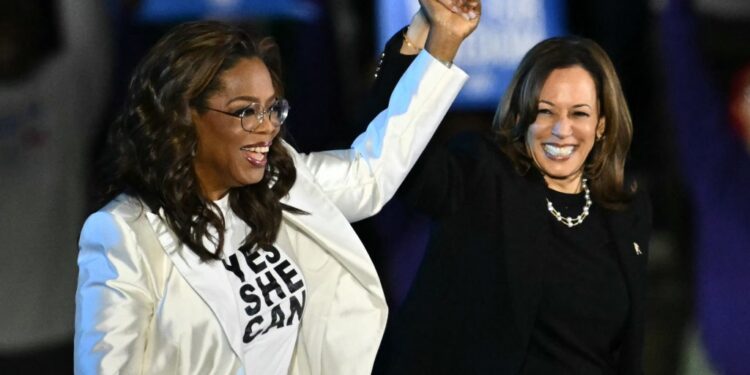Oprah Winfrey has tried to tamp down the notion — which has gotten some traction on social media — that she was paid $1 million to endorse Kamala Harris.
The story gained fuel after a Washington Times story that cited campaign finance records showing that Oprah Winfrey’s production company, Harpo Productions, was paid a total of $1 million for event production.
There’s a reason that the payment was made: Campaign finance law.
Federal Election Commission rules require campaigns to pay the fair market value for the ancillary costs of holding events — everything from staging to the band to food and drink.
Federal law prohibits corporations from giving directly to a candidate’s campaign, so it would be up to the campaign to reimburse those costs. A performer could pick up the tab herself, but according to the FEC, “when a person or entity pays for services on the committee’s behalf, the payment is an in-kind contribution.” The value counts against federal contribution limits “as a gift of money does.” The limit for an individual contribution was $3,300 to the candidate, and $926,300 to a joint victory fund that raised for the campaign, the Democratic National Committee and state parties.
As the campaign and some of its spending has drawn scrutiny following Harris’ defeat, officials are pushing back on the idea that it paid for celebrity support.
Adrienne Elrod, who served as senior adviser and senior spokesperson for the Harris campaign, told Deadline, “We do not pay. We have never paid any artist and performer. We have never paid a fee to that person.”
What the campaign is required to do is pay “for any ancillary costs for that performance.” That could include everything from travel to paying band members to a backline producer.
“There are laws that have to be followed that we have followed religiously on this campaign,” she said.
In a TMZ video, Winfrey herself denied that she was paid, and she followed up with a response to a comment in The Shade Room, in which she also defended the sum paid for the production.
“Usually I am reluctant to respond to rumors in general, but these days I realize that if you don’t stop a lie, it gets bigger. I was not paid a dime,” Winfrey wrote. “My time and energy was my way of supporting the campaign. For the live streaming event in September, my production company Harpo was asked to bring in set design, lights, cameras, crew, producers and every other item necessary (including the benches and the chairs we sat on) to put on a live production. I did not take any personal fee. However, the people who worked on that production needed to be paid. And were. End of story.”
The live streaming event was a town hall, held in September, which had the feel of one of Winfrey’s daytime shows. The sit down with Harris was a campaign event — promoted heavily on social media — and it included an audience of rank-and-file supporters and celebrities such as Meryl Streep, Chris Rock and Jennifer Lopez.
It was also one way that the Harris campaign deployed celebrities in the last three months. Bruce Springsteen, Eminem and Lady Gaga were among those who throughout the battleground states, something that has itself generated questions as to just how effective they ultimately were, given Harris’ loss, and whether they merely played into Donald Trump‘s railing against the so-called elite.
That said, the criticisms have been raised before after Democratic losses. Gaga, for instance, appeared with Hillary Clinton in the final days of her campaign. Yet she also appeared for Joe Biden at one his final events in 2020, the year he won. For his part, Trump also tapped celebrities, including Lee Greenwood and Hulk Hogan, and his campaign spent some of the final week dealing with the fallout of a comedian’s racist jokes at a Madison Square Garden rally.






